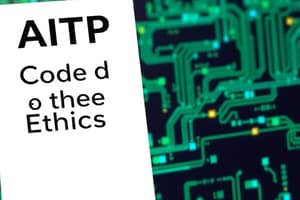Podcast
Questions and Answers
What is the primary concern of computer ethics?
What is the primary concern of computer ethics?
- Protecting intellectual property rights
- Ensuring the ethical implementation and use of computing resources (correct)
- Enhancing user experience and interface design
- Developing secure software and systems
What is a key issue surrounding computer ethics in the context of the internet?
What is a key issue surrounding computer ethics in the context of the internet?
- Internet privacy and copyright infringement (correct)
- Unlicensed software distribution
- Unregulated data sharing
- Cyberbullying and online harassment
What is a critical aspect of professional ethics in computing?
What is a critical aspect of professional ethics in computing?
- Respecting intellectual property and copyrights (correct)
- Prioritizing efficiency over user experience
- Adapting to changing global regulations
- Following the latest technology trends
What is a potential consequence of violating computer ethics principles?
What is a potential consequence of violating computer ethics principles?
Which of the following is NOT a core issue in computer ethics?
Which of the following is NOT a core issue in computer ethics?
What is the primary goal of professional codes of conduct in computing?
What is the primary goal of professional codes of conduct in computing?
What is a key consideration in global and local IT laws and regulations?
What is a key consideration in global and local IT laws and regulations?
What is a critical aspect of property rights and intellectual property in computing?
What is a critical aspect of property rights and intellectual property in computing?
What is a potential consequence of violating privacy and freedom of expression in computing?
What is a potential consequence of violating privacy and freedom of expression in computing?
What is the primary purpose of computer ethics in the context of professional responsibilities?
What is the primary purpose of computer ethics in the context of professional responsibilities?
Flashcards
Computer Ethics
Computer Ethics
The study of ethical principles and practices related to computer technology and its usage.
Professional Ethics
Professional Ethics
Moral principles that guide behavior in a professional setting, particularly in the IT industry.
Professional Responsibilities
Professional Responsibilities
The duties and obligations of an IT professional towards clients, employers, and society.
Copyright Infringement
Copyright Infringement
Signup and view all the flashcards
Internet Privacy
Internet Privacy
Signup and view all the flashcards
Professional Codes of Conduct
Professional Codes of Conduct
Signup and view all the flashcards
Ethical Issues in IT
Ethical Issues in IT
Signup and view all the flashcards
Critical Reasoning
Critical Reasoning
Signup and view all the flashcards
IT Professional Ethics Failure
IT Professional Ethics Failure
Signup and view all the flashcards
Property Rights in IT
Property Rights in IT
Signup and view all the flashcards
Study Notes
Course Overview
- The course covers legal, social, ethical, and professional issues involved in the utilization of computer technology.
- It adapts professional ethical and legal practices in both local and global communities.
- The course introduces students to ethical issues such as property rights, freedom of expression, privacy, and Professional Codes of Conduct.
- It equips students with tools for critical reasoning to construct and analyze ethical issues and problems in business and the corporate world.
- The course aims to provide an understanding of social and professional issues in modern society.
- It discusses the different laws and ethics that govern the IT industry.
Assignment #1: Analysis of Professional Ethics in the IT Industry
- Objective: To understand and analyze the importance of professional ethics in the IT industry.
- The assignment consists of four parts:
- Computer Ethics: Discuss ethical issues that arise from the use of the Internet, such as privacy, copyright infringement, and user interaction with websites, software, and related services.
- Professions and Professional Ethics: Discuss the role of professional codes of conduct in the IT industry and analyze the impact of professional ethics on the quality of work and the work environment.
- Professional Ethic Failures: Provide examples of professional ethic failures in the IT industry and analyze their impact on the individuals and organizations involved.
- Professional Responsibilities: Discuss the responsibilities of IT professionals towards their clients, employers, and society.
Submission Guidelines
- The assignment should be submitted in a PowerPoint format.
- The word limit for the assignment is 2000-2500 words.
- A bibliography citing all the sources used is required.
- The assignment should be submitted by the due date.
Course Learning Outcomes
- Define Computer Ethics and Professional Ethics.
- Explain the professional responsibilities of an individual.
Computer Ethics
- Computer ethics deals with the procedures, values, and practices that govern the process of consuming computing technology and its related disciplines without damaging or violating the moral values and beliefs of any individual, organization, or entity.
- It primarily enforces the ethical implementation and use of computing resources.
- It includes methods and procedures to avoid infringing copyrights, trademarks, and the unauthorized distribution of digital content.
- The core issues surrounding computer ethics are based on the scenarios arising from the use of the Internet, such as Internet privacy, the publication of copyrighted content, and user interaction with websites, software, and related services.
Studying That Suits You
Use AI to generate personalized quizzes and flashcards to suit your learning preferences.




